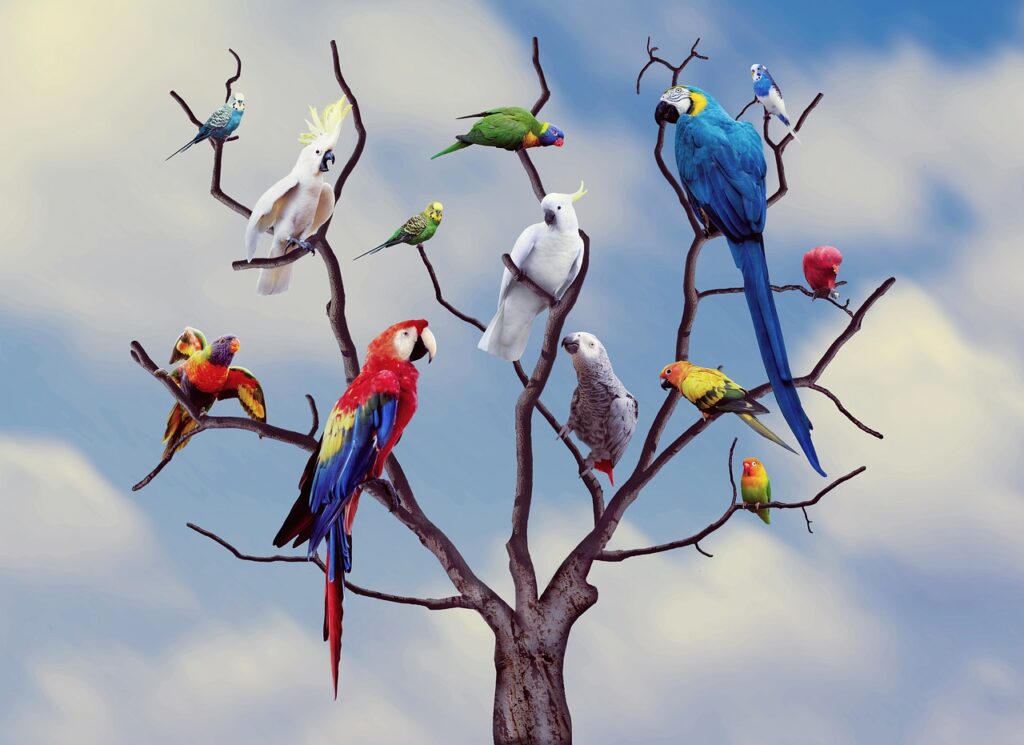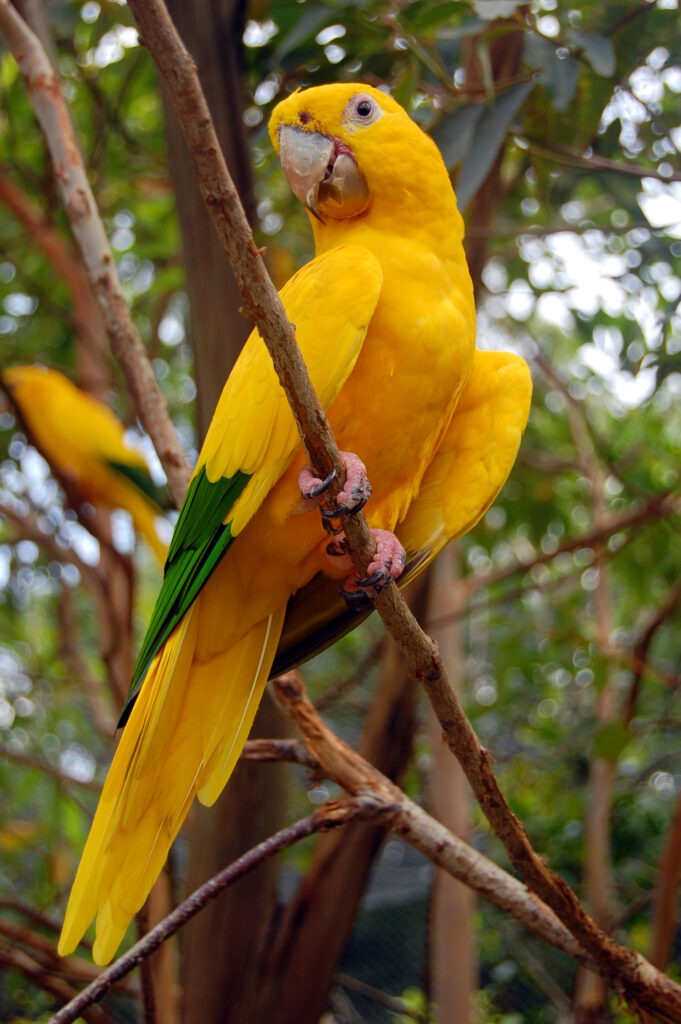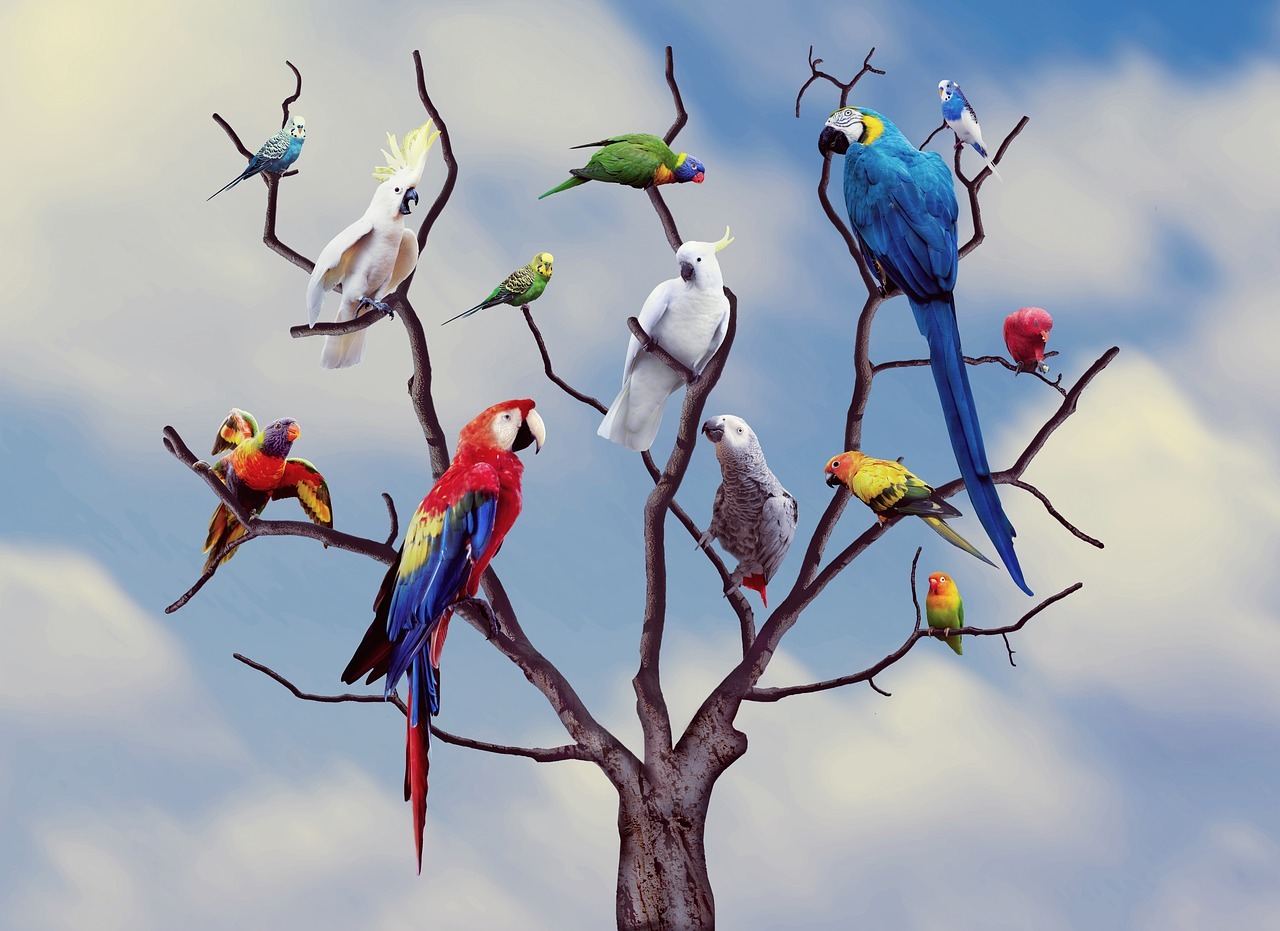 Nutritional needs for different species
Nutritional needs for different species
The foods that birds eat in the wild vary from region to region with each type of food having a different nutritional value. The following information is given purely as a guide for the different nutritional needs of different species of birds. However, like people, a healthy varied diet is the key to good health. If you feed a wide variety of healthy foods your bird will be getting all the vitamins and minerals he needs to keep him healthy. It is always recommended that before putting your bird on a specific diet that you check with your avian vet beforehand.
AmazonsAmazons may have a tendency toward Vitamin A deficiencies. They need to have a diet that includes squash, pumpkin, spinach, red chilli peppers and other foods rich in Vitamin A. Amazons also have a tendency to be overweight so they need a diet of foods that are lower in fat. They should also be fed a diet that is lower in protein.
EclectusIt is believed that Eclectus may have a higher need for Vitamin A in their diets Vitamin A can be found in most fruits and yellow or green vegetables. It’s also found in liver, carrots, squash, pumpkin, sweet potatoes, spinach, apricots, cantaloupe, dandelion leaves, red chilli peppers, broccoli, peaches, egg yolk and peas.
African Greys, Cockatoos and CockatielsGreys, Cockatoos and Cockatiels are known as powder birds and may need diets that are rich in calcium. Good sources of calcium are dark green leafy vegetables, broccoli, dried beans and peas, bone meal, cuttlebone, kale, and tofu.
When dealing with your birds diet please remember that dairy products should be used sparingly because birds are lactose intolerant.
 MacawsMacaws may require a diet that is higher in fat. They also need a diet that consists of a wide variety of nuts, and some species need a diet that is lower in protein. Hyacinth macaws are specialised eaters in the wild. They eat mainly the nuts from the Scheela and Atalea Palms. They need to be fed macadamia nuts, brazil nuts, walnuts, coconuts, pecans and other nuts. They need more fat and carbohydrates and less protein in their diets. Good sources of carbohydrate for birds are wheat, oats and rice. Small amounts of fats are needed in bird diets, it’s necessary to keep the skin soft and the feathers in good condition. Fats should only be fed in limited amounts because too much can lead to obesity. As the high fat content in the diet increases, so does the cholesterol level. High cholesterol levels can lead to blocked arteries and heart disease. High fat diets are one of the causes (but not the only cause) of fatty liver disease.
MacawsMacaws may require a diet that is higher in fat. They also need a diet that consists of a wide variety of nuts, and some species need a diet that is lower in protein. Hyacinth macaws are specialised eaters in the wild. They eat mainly the nuts from the Scheela and Atalea Palms. They need to be fed macadamia nuts, brazil nuts, walnuts, coconuts, pecans and other nuts. They need more fat and carbohydrates and less protein in their diets. Good sources of carbohydrate for birds are wheat, oats and rice. Small amounts of fats are needed in bird diets, it’s necessary to keep the skin soft and the feathers in good condition. Fats should only be fed in limited amounts because too much can lead to obesity. As the high fat content in the diet increases, so does the cholesterol level. High cholesterol levels can lead to blocked arteries and heart disease. High fat diets are one of the causes (but not the only cause) of fatty liver disease.
ConuresConures require a diet that is higher in fat and lower in protein. Conures should be given vegetables that are rich in vitamin K. Conures are prone to Conure Bleeding Syndrome, which could be caused by lack of vitamin K. Vitamin K can be found in mainly in green vegetablesincluding broccoli, cabbage, asparagus, peas, green beans, and spinach. It’s also produced by bacteria in the bowels. Vitamin K is known as a water soluble vitamin and therefore must be replenished continually.
Lories and LorikeetsLories and Lorikeets need a diet that is higher in carbohydrates and lower in protein. Their diet should contain no more than 15% protein. The primary diet of is fruit and nectar. They should not be given seeds because their gizzard are weaker than other birds and cannot grind up the seeds. Lots of fruits and fresh greens should be given as a supplement to their diet.
All ParrotsIf a seed mix is being fed alongside fresh food, vitamin supplementation must be provided (i.e. daily essentials, avipro avian or similar). Calcium and vitamin D3 should also be provided in water at least twice weekly (i.e. calcivet or zolcalD), or under the advice of an avian vet, depending on the bird’s requirements at that time. African Grey parrots are more susceptible to low calcium levels (hypocalcaemia) so they should be provided with calcium in the water more frequently.
For additional reading, you may find the following links informative:
Ways to sneak good food into your picky eaters diet
How do I get my birds to eat good foods – 5 tips
Adapted from the Healthy Bird Cookbook by Robin Deutch
